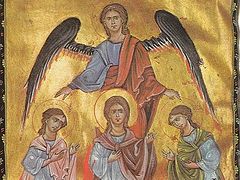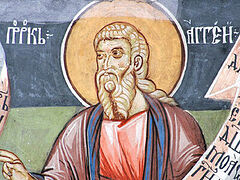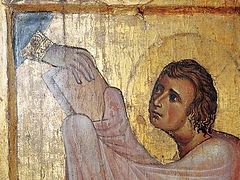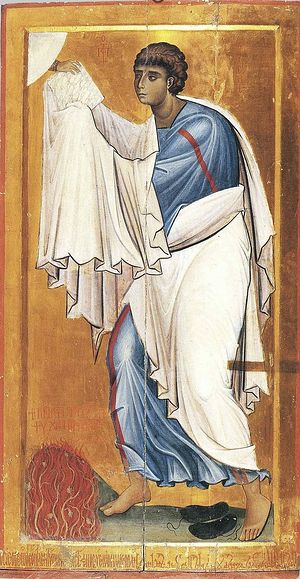 The life of Holy Prophet and God-Seer Moses, unlike that of many other righteous ones of the Old Testament, is well described in the Bible (see Ex. 2–Deut. 34:12). Nevertheless, unfortunately we rarely turn our attention to the virtues of the saint, who was worthy to see the glory of God face-to-face. Perhaps his Old Testament origin is to blame, because he seems to us unable to have the full measure of virtues available to mankind renewed in Christ. Meanwhile, St. Gregory of Nyssa chooses precisely the virtues of the holy God-Seer Moses as an illustration of “the perfect life as it is accessible to people” (On the Life of Moses the Lawgiver).
The life of Holy Prophet and God-Seer Moses, unlike that of many other righteous ones of the Old Testament, is well described in the Bible (see Ex. 2–Deut. 34:12). Nevertheless, unfortunately we rarely turn our attention to the virtues of the saint, who was worthy to see the glory of God face-to-face. Perhaps his Old Testament origin is to blame, because he seems to us unable to have the full measure of virtues available to mankind renewed in Christ. Meanwhile, St. Gregory of Nyssa chooses precisely the virtues of the holy God-Seer Moses as an illustration of “the perfect life as it is accessible to people” (On the Life of Moses the Lawgiver).
We will dwell on only a few examples from the marvelous life of this great servant of Divine Providence. The God-Seer’s very name already tells us much. In the Holy Scripture of the Old Testament, God stands before us as the thundrous and omnipotent Ruler of the world. His glory frightened people, they were afraid to come close to the place of His appearance. Here is what it says about this in Scripture: And it came to pass on the third day in the morning, that there were thunders and lightnings, and a thick cloud upon the mount, and the voice of the trumpet exceeding loud; so that all the people that was in the camp trembled. And Moses brought forth the people out of the camp to meet with God; and they stood at the nether part of the mount. And mount Sinai was altogether on a smoke, because the Lord descended upon it in fire: and the smoke thereof ascended as the smoke of a furnace, and the whole mount quaked greatly. And when the voice of the trumpet sounded long, and waxed louder and louder (Ex. 19:16–19). This picture of the manifestation of divine glory could seem truly frightening and quite far from the real life of the New Testament. Nevertheless, the attentive eye sees in it the manifestation of the Same God, Who would much later come to the world in order to show the depths of His mercy to fallen man. After all, it is ruly amazing that in the center of this grandiose picture, when His lightening illumines the universe; the earth quaked and was trembled; the mountains melt like wax from the face of the Lord, from the face of the Lord of all the earth (Ps. 96:4–5), in the foreground is the meeting of man with God. It would seem—who could hear the feeble voice of a slow-tongued man against the background of such grandiose manifestations of nature. But Holy Scripture concludes the story unambiguously: Moses spake, and God answered him by a voice (Ex. 19:19). Before us is a picture that truly astounds us with the grandeur and profound meaning of the Creator’s love for His creation. The Lord appears in the thunderous brilliance of His glory, but He appears in order to hear the voice of a man, in order to answer him. And this a real, worthy testimony of God and the depths of His compassion and mercy toward us. After all, The Lord our God is great, and a great King over all gods. In His hands is the depts of the earth, and the mountain peaks are His; His is the sea, and He created it, and the dry land is the work of His hands (Ps. 94:3–5). But when people disregarded their Creator and were deserving of the worst possible punishments, then the repentant word alone of one of His servants inclines God’s wrath to mercy: Oh, this people have sinned a great sin, and have made them gods of gold. Yet now, if thou wilt forgive their sin; and if not, blot me, I pray thee, out of thy book which thou hast written (Ex. 32:31–32), said Moses to God, and… was heard!
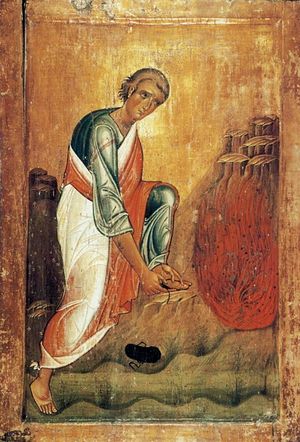 Similar pictures of the self-forgetting intercession for his people with which the whole life of the God-Seer Moses was filled, fills our soul with awe and trembling before the merciful God. Our God is truly the Creator and Sovereign of the world. His glory is inexpressible, His might is unfathomable; yet all this He verily covers and hides, when before Him stands His beloved creation in humility and reverence. The prophet asks the Lord a favor, which, it would seem, is astounding for its exactingness and boldness: Show me Thy glory (Ex. 33:18). God’s answer is filled with love and tender care. The God-Seer asks for the impossible, inasmuch as man cannot see God and remain among the living (cf. Ex. 33:20). But the Lord does not leave the request of his faithful servant unheard and does everything that can be possibly done for a man, to fulfill his request: And the Lord said, Behold, there is a place by me, and thou shalt stand upon a rock: And it shall come to pass, while my glory passeth by, that I will put thee in a clift of the rock, and will cover thee with my hand while I pass by: And I will take away mine hand, and thou shalt see my back parts: but my face shall not be seen (Ex. 33:21–23).
Similar pictures of the self-forgetting intercession for his people with which the whole life of the God-Seer Moses was filled, fills our soul with awe and trembling before the merciful God. Our God is truly the Creator and Sovereign of the world. His glory is inexpressible, His might is unfathomable; yet all this He verily covers and hides, when before Him stands His beloved creation in humility and reverence. The prophet asks the Lord a favor, which, it would seem, is astounding for its exactingness and boldness: Show me Thy glory (Ex. 33:18). God’s answer is filled with love and tender care. The God-Seer asks for the impossible, inasmuch as man cannot see God and remain among the living (cf. Ex. 33:20). But the Lord does not leave the request of his faithful servant unheard and does everything that can be possibly done for a man, to fulfill his request: And the Lord said, Behold, there is a place by me, and thou shalt stand upon a rock: And it shall come to pass, while my glory passeth by, that I will put thee in a clift of the rock, and will cover thee with my hand while I pass by: And I will take away mine hand, and thou shalt see my back parts: but my face shall not be seen (Ex. 33:21–23).
Truly amazing is God’s love of mankind, His attention to His creation. Amidst the rolls of thunder and magnificent manifestations of natural elements, God hears even the quiet voice of His servant; He is ready to decrease His glory, to limit His omnipotence, in order to bring a man to Himself. He hears, and answers. But He also awaits a response from us. The life of the God-Seer Moses shows us that the mercy of our Creator is not an all-forgiving attempt to please, not blind tolerance. No, it is something different. The mercy of our God is the manifestation of His omnipotence, His power and self-sufficiency. He hears those who call out to Him with contrite hearts, He shows mercy and love to those who seek Him, but he also requires a response from those whom He addresses. We must not forget about the great responsibility that lies upon those whom God hears. For He also addresses us. And His word cannot be trampled upon or disregarded. This is the word of the Creator of the World! That is how it should remain in our lives. And if even such a great and righteous man as Moses did not enter the promised land because of his rash murmuring (cf. Num. 20:10–12), then what judgment shall there be over those who have communed of God Himself, yet disregard His word?..

